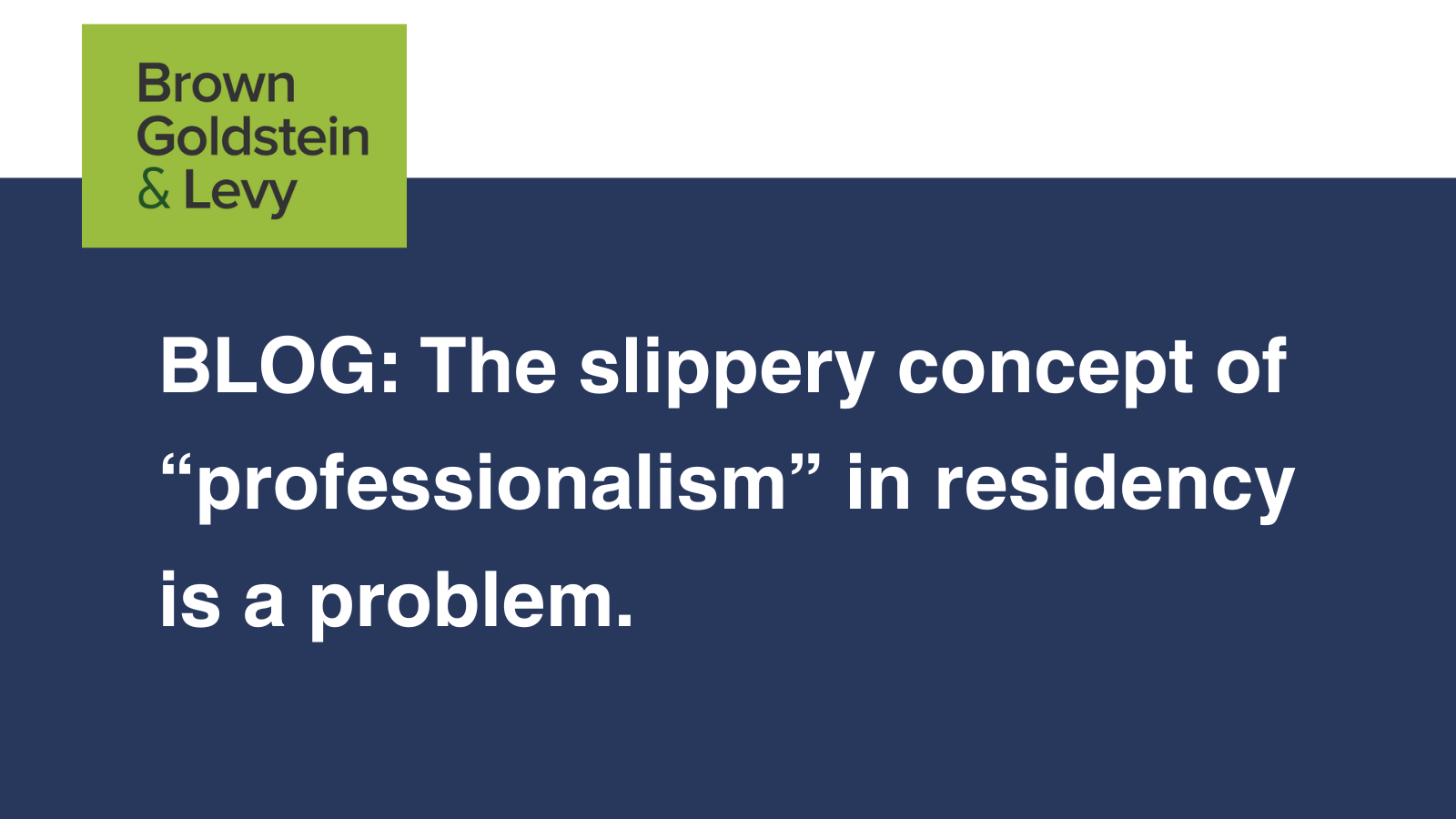By Greg Care
Residents and fellows in ACGME-accredited coaching packages know effectively that “Professionalism” is likely one of the six core competencies they’re to develop in the middle of their coaching. As I’ve expressed up to now, although, professionalism is a catch-all competency ceaselessly cited as a foundation for remediation and self-discipline. And the subjectivity of the worth judgments that inform evaluations of professionalism make this competency one that’s ripe for abuse in disciplining trainees.
A brand new piece in The New York Occasions by Rachel E. Gross shines a light-weight on this downside, which deserves the total consideration of the ACGME, the AAMC, specialty boards, licensing boards, medical colleges, and residency and fellowship packages. In keeping with my expertise and that of numerous different trainees, Ms. Gross wrote: “Relying on who makes the decision, unprofessional conduct can imply hugging your program director, letting a bra strap present, sporting braids, donning a swimsuit over the weekend or sporting a ‘Black Lives Matter’ sweatshirt within the E.R.” And, extra troubling nonetheless, as a result of trainees of colour seem like disproportionately falling sufferer to dismissals from packages (constituting 20% of dismissals whereas representing simply 5% of trainees, per 2015-16 knowledge), there’s concern that cultural or racial biases—acutely aware or unconscious—are at work.
There may be an growing quantity of scholarship round this subject, together with a current article that concluded {that a} resident’s race/ethnicity was related to evaluation scores, to the drawback of residents who’re underrepresented in medication (i.e., Black, Hispanic/Latinx, and Native American physicians). The affiliation could replicate bias in school evaluation, results of a non-inclusive studying setting, or structural inequities in evaluation. This identical article additionally discovered that male school rated residents who’re underrepresented in medication 0.13 factors decrease in professionalism than non-underrepresented residents, whereas girls school rated underrepresented residents 0.01 factors increased than their represented counterparts.
For its half, the ACGME has denounced racism, implicit bias, and different types of discrimination in graduate medical training. It factors to, amongst different issues, its Widespread Program Necessities that mandate a “skilled, equitable, respectful, and civil setting that’s free from discrimination, sexual and different types of harassment, mistreatment, abuse, or coercion of scholars, residents, school, and employees.” Nonetheless, in an article revealed within the December 2023 subject of the Journal of Graduate Medical Training, the authors wrote that “[r]acial and gender bias seems to exist in Accreditation Council for Graduate Medical Training competencies and Milestone achievement, as some research have discovered that White residents attain the next stage of Milestone achievement than non-White trainees.”
Keep in mind, additionally, that the ACGME Widespread Program Necessities instruct program administrators and school to be position fashions, particularly within the realm of professionalism. So far, the ACGME’s September 2017 CLER Difficulty Temporary on professionalism famous that “[p]rofessionalism isn’t solely a person duty; it’s formed by the setting.” In different phrases, packages can hardly anticipate trainees, who’re taking cues from the conduct of their attendings, to take significantly alleged deficiencies of their professionalism which might be tolerated of their attendings. In an setting the place assembly expectations is paramount to development in the direction of unbiased observe, residency and fellowship packages owe their trainees a transparent and constant utility of these expectations from high to backside.
Whereas the talk on the perfect strategies of pre-empting bias from occurring is underway, together with coaching and mitigation of implicit biases, there are nonetheless a whole lot of residents presently being subjected to unfair remediation and self-discipline based mostly on amorphous ideas like professionalism. And complicated or well-informed packages and establishments really feel emboldened to take action due to an expectation that the courts won’t intervene with their ostensible “educational judgment.” That is the place the ACGME can and should step in to place an finish to the open-ended and nebulous idea of professionalism that ensnares so many promising residents and fellows. Sponsoring establishments and packages sorely want an authoritative assertion on the boundaries of professionalism, together with what’s and isn’t a deficiency in professionalism as outlined by the Widespread Program Necessities.
Furthermore, the ACGME should require that the “due course of” it requires for non-promotions, non-renewals, suspensions, and dismissals can’t be happy merely by asking, mechanically, if the assorted steps within the disciplinary course of have been carried out. It is a mockery of due course of that’s now very a lot en vogue at establishments throughout the nation. It robs the trainee, on the most pivotal second of their profession, of a important evaluation of whether or not the underlying allegations benefit the implications this system is meting out. No less than in that circumstance, the reviewer or panel of reviewers can choose (hopefully, in an goal trend) whether or not the alleged lapses in professionalism which have change into all too slippery are literally current and whether or not they are often remediated.
In case you have questions concerning remediation, probation, or different types of self-discipline in residency, please contact us at the moment to see if we will help.
* Content material on this web site, together with weblog articles, are proprietary and copyright protected. In case you want to use all or a part of a weblog article, we request that you just correctly attribute the work and embody a hyperlink to the Brown, Goldstein & Levy webpage on which it seems.
